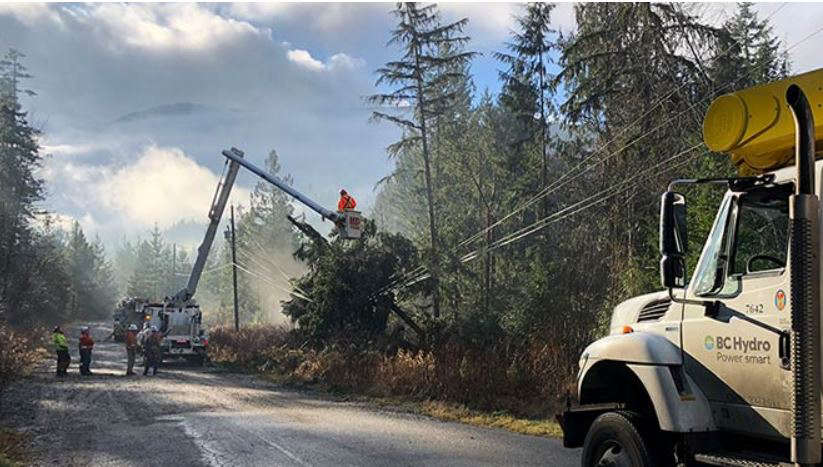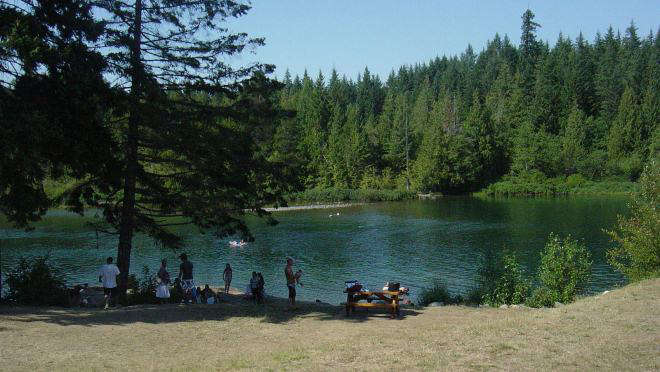
With what could be a more volatile storm season underway, BC Hydro is urging residents to be prepared.
A new survey reveals a generational divide in storm preparedness: younger adults are the least ready for power outages, while those aged 35 to 54 are the most proactive.
The findings come as BC Hydro braces for a La Niña season, which typically brings cooler, wetter weather and an increased likelihood of a very active season storm-wise.
There’s also the impact of multi-year drought conditions, which have weakened vegetation and increased the likelihood of falling trees and branches – one of the leading causes of power outages.
“In 2024, over 1.4 million BC Hydro customers faced weather-related outages, the highest on record,” said Susie Rieder, BC Hydro spokesperson.
“Even with the unprecedented surge, our crews responded faster than ever. But with La Niña expected to intensify storm activity this fall and winter – on top of the effects of multi-year drought – it’s more important than ever for British Columbians to be prepared.”
With La Niña expected to intensify storm activity this fall and winter, on top of the effects of multi-year drought, Rieder says it’s more important than ever for British Columbians to be prepared.
The survey shows that while 18–34-year-olds recognize that storms are becoming more frequent, they are also the least likely to take steps to prepare.
More than half in this age group have not assembled an emergency kit, compared to the majority of 35–54-year-olds and nearly half of those over 55 who have.
Cost and uncertainty about how to start are the most common reasons younger adults cite for not preparing.
About 15 percent say they’ve built a kit in the past but didn’t use it, leading them to believe it was unnecessary.
Their top concern during an outage – staying connected.
The survey showed that despite their reliance on technology, younger British Columbians are the most likely (76 per cent) to have key phone numbers memorized.
At the same time, they are the least likely to recognize the dangers of downed power lines.
BC Hydro says it has stepped up its preparations to reduce outage risks and improve response times – especially in light of ongoing drought conditions.
Crews are now strategically pre-deployed and dispatched more efficiently during major events, based on lessons learned from past storms.
It has also tripled its budget to $150 million to clear vegetation around power lines year-round.
Also, BC Hydro says smart meters provide real-time data to pinpoint outages and speed up restoration, and advanced meteorological models are helping predict storm impacts and allocate resources more effectively.
BC Hydro encourages everyone to take simple steps to be prepared in case of a power outage, including getting an emergency kit ready with enough supplies to last for at least 72 hours and including a flashlight, extra batteries, first aid kit, non-perishable foods, and bottled water.
For more information on how to prepare and stay safe, visit BC Hydro.


 Comox Acquires Land For New Public Park
Comox Acquires Land For New Public Park
 Road Closure For Glen Eagle Drive Water Repair
Road Closure For Glen Eagle Drive Water Repair
 Work To Begin Soon On Puntledge River Recreation Area Trail Improvements
Work To Begin Soon On Puntledge River Recreation Area Trail Improvements
 BC Wildfire Service Staff Welcomed Home From Australia
BC Wildfire Service Staff Welcomed Home From Australia
 Chief Coroner Directs Inquest into Tumbler Ridge Deaths
Chief Coroner Directs Inquest into Tumbler Ridge Deaths
